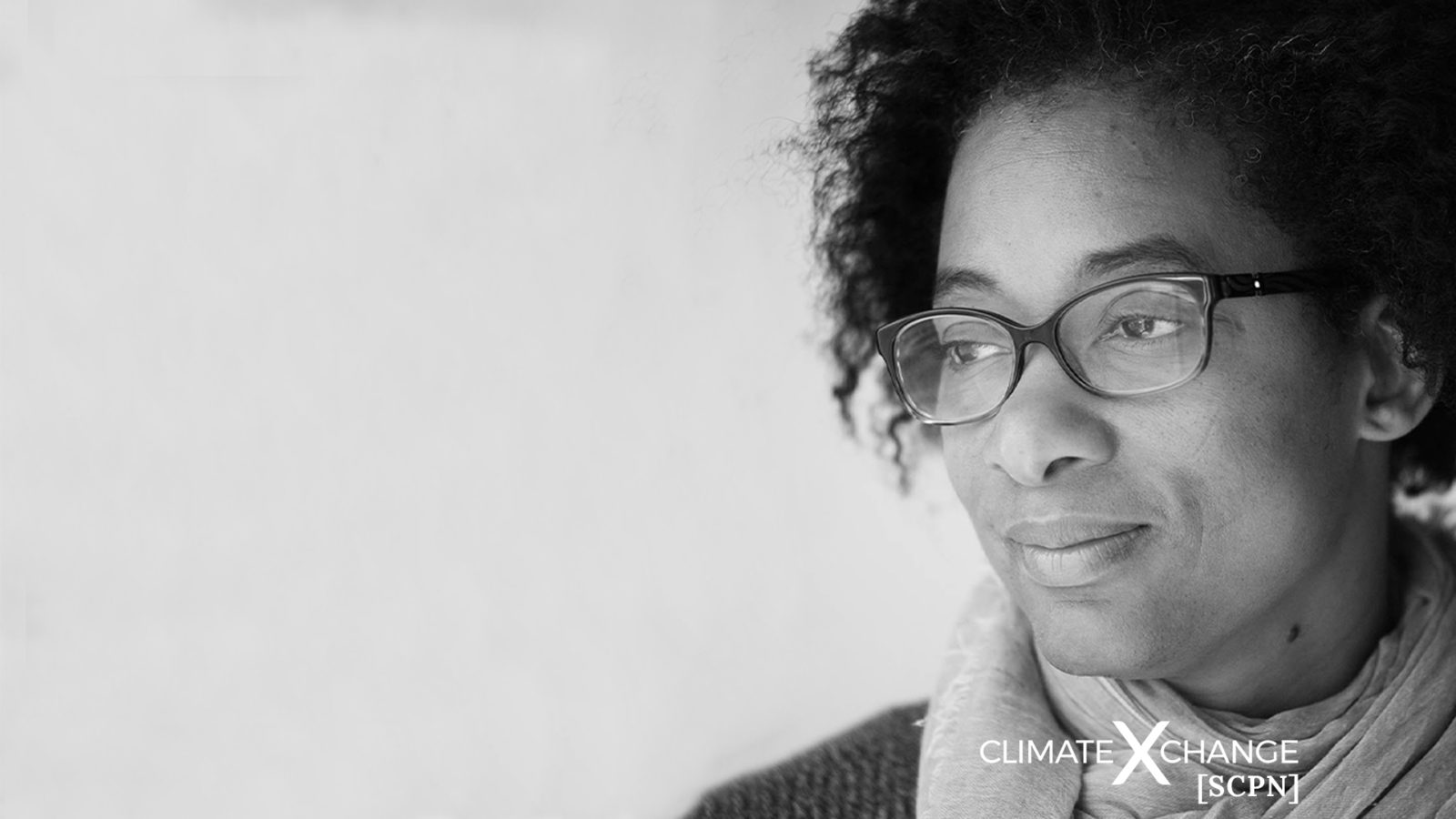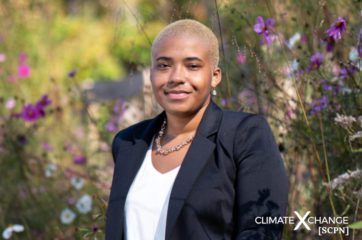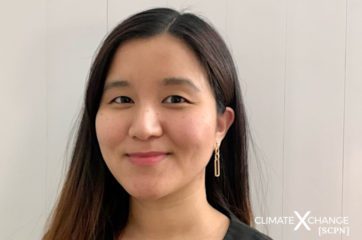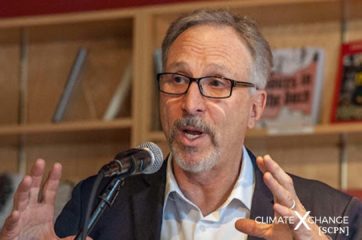All across the country, members of our State Climate Policy Network (SCPN) are fighting to make an impact on climate change in their communities. We have individuals in our Network from all 50 states, each experiencing climate change differently in their local areas and finding unique solutions to build resiliency efforts.
Tina Johnson is the director of the National Black Environmental Justice Network and is Principal of Johnson Strategy & Development Consultants, which works with a broad international network including groups from Europe and the U.S, top NGOs, governments, international foundations, and businesses. She specializes in U.S. and international Climate Change Policy, diplomacy, international climate change strategic development and advocacy. Tina’s work investigates domestic and international policies and issues around climate justice, sustainability, economics, energy, and climate change.
This interview has been edited for brevity and clarity.
Elise Gilliam
Let’s just start with going into your story — if you could just tell me about yourself and the path to where you are today? I would love to hear about your work with the National Black Environmental Justice Network and your passions.
Tina Johnson
My name is Tina Johnson, and I consider myself to be an accidental activist. I definitely did not see my life being formatted in social justice spaces, but actually found myself initially engaged in food justice and food security around 12 or 15 years ago with the development of a food cooperative in the community where my family is from. Chester, Pennsylvania, didn’t have a grocery store for like 22 or 23 years, so I organized and developed a food cooperative that was owned and operated by the community. It is structured so that the community makes the decisions — they vote, they have the power. The co-op existed because they wanted it to exist. Members of the community work six hours a year in exchange for a reduced cost on food. The food that we were able to get into the store was high quality, organic, locally sourced and was centered around a democratic process of engagement. At that moment I wanted to do something because I was like, ‘well, why don’t we have food in the first city in the Commonwealth of Pennsylvania? And how is this possible?’ I lived in India and I could get a banana at the base of the Himalayas, so I was like, okay, something’s wrong with this. That’s why I call myself an accidental activist, because I definitely was not thinking about food justice, but I ended up doing that work.
I would say, my passion in general for my life is one that’s focused on being a steward and making the world better than what I have found it. It’s sort of finding ways to share whatever talents, gifts, knowledge, and experience that I have in spaces with people who are open to receiving it. That work has usually taken the shape of working with and on issues in communities or in a work environment where there is a need to push further for progress, to answer the call of injustice. I’m a middle child of 12, so I think maybe that has something to do with it as well. When you’re the middle child, you believe in fairness, and I’m also an identical twin. I think that has a lot to do as well with my sense of fairness. I believe that fairness is possible if we are willing to do the work to make our societies fair, our lives fair, our relationships fair. That’s kind of what has shaped my personal and professional work.
In doing the work I did in Pennsylvania around food justice, I came to understand that between the work that was being done by the folks on the ground — those who were really pushing for more progress, more fairness, more justice — and the actual policy that was going to be affecting the work that they wanted to see happen or the work that they were doing, there was a disconnect about how these two things actually work together. And so I took a job in D.C., working as a senior director for an organization on environmental justice. I really wanted to see how you could take the frontline campaign and connect that to the policy space.
I would say, my passion in general for my life is one that’s focused on being a steward and making the world better than what I have found it. It’s sort of finding ways to share whatever talents, gifts, knowledge, and experience that I have in spaces with people who are open to receiving it.
If there’s not a strong connection between what folks really care about and the change they’re interested in seeing in their communities, then the policy doesn’t resonate because it doesn’t connect to the core of what the issue is. That makes it really difficult for change, especially transformational change. I am very interested in transformational change. I’m always confused, baffled, bewildered, stunned about how there’s a cycle or pattern that continues where the same fights are fought in different spaces consistently over time with some big movement forward, but then stagnation sets in. And then it’s challenging to even find a way to move us even further along because we’ve made some inroads, but we still haven’t made the effective transformation or change that has made it sustainable, maintainable, and impactful.
The work that we do with the National Black Environmental Network (NBJN), which we launched in June of last year, is rooted in the need for a network that was focused on issues facing the African diaspora. With COVID-19, for example, that was an issue that really got us to make the decision to engage again. The network was already in existence but with the murders of Breonna Taylor, George Floyd and Ahmaud Arbery, and in that span of time with the COVID-19 pandemic and then the social racism pandemic, these two things converged at that moment and was sort of a catapult for the network to be re-launched, to re-engage. The reason why I’m engaged in the network is because I do believe that it’s transformational. It has the ability to do something that groups are already doing, maybe more regionally or more locally, but by connecting the scholarship and the academic research analysis to the grassroots, while being driven by the grassroots. That work could be a resource, a broader umbrella, the connective tissue to the social movement spaces that exists. Environmental justice is not simply a racial justice issue, right? I say to folks, ‘if you work in any way where you believe that your work, your ideologies, your focus is around creating fair, just access, fair, just opportunities, fair, just jobs, fair, just climate solutions then it is rooted in environmental justice, because environmental justice is where you work, live, play worship, and the natural world around you.
The network really does take into its approach this holistic way of looking at the world in which we all participate in, and that’s why I think environmental justice as a term is really wonderful. For folks to understand that it’s far more reaching than simply a one issue area, but a multi-issue area that takes on lots of different approaches for many different communities that are considered less fortunate. Whether it’s because of high rates of poverty or racial injustice, or because they’re living next to a petrochemical plant, or they have high levels of unemployment, there are these connections to the communities overall, who understand that in order for us to have a more just society that all the boats need to be raised. People need to have access to policy that actually reflects the movement towards a more equitable and just system and society, so the rootedness for NBJN is really the equity and justice lens. That is the vehicle that I believe is useful in getting us a transformative change.
I say to folks, ‘if you work in any way where you believe that your work, your ideologies, your focus is around creating fair, just access, fair, just opportunities, fair, just jobs, fair, just climate solutions then it is rooted in environmental justice, because environmental justice is where you work, live, play worship, and the natural world around you.
Elise Gilliam
You’re currently the Director of the NBJN, which has its foundations in the principles of environmental justice that strengthens coalitions, alliances, and collaborations and is committed to fighting inequity and the perpetuation of vulnerabilities on multiple fronts. Could you talk a little bit more about the specific work the network does, and the alliances and collaborations that it uses?
Tina Johnson
Right now, the network is in what I consider to be its capacity organizational development phase. We are engaging in conversations with our members who are doing the work because we’re a grassroots focused organization. Our grassroots lead our overarching scope of work that we do. It’s based upon the areas of priorities that they have identified, which are deeply rooted in the work that currently exist are things they know that they would like to be engaging in.
The network’s role is really making sure that there are these connections between the policy and the grassroots work so that those two things are working side by side and reflect one another. They’re mirrors of one another, but driven by the community work. Then our focus really is to find a way within the network to develop out the capacity for groups on the ground, whether it’s through modeling, research, or connecting communities and issues to the broader national conversation. It’s narrative building and communications output, so that you can elevate those stories and make sure that folks are engaged and aware of the solutions that are coming from the frontlines and grassroots communities, but also the power that exists there.
I’d like to qualify that the work that we do is really reflected in the work that our members do. We are not replacing or overtaking a space that has been in existence before we relaunched and before the network existed. There’s a framework by which you can see how these approaches of policy advocacy, as I call it, and campaign advocacy work together to actually ensure greater effectiveness and change. It’s been a building year and will continue to be a building year, but during that time, it’s the coalitions and collaborations that are making sure that there’s any input that needs to be taken into consideration around the Climate Action Plan – whether it’s domestic or international, that we are engaging in that discussion. And then also really looking at the opportunities to model out some of the concerns that we have, through an equity and justice lens, that can be a part of the conversations that are taking place where you have large organizations who are well resourced and can model out for an economic outcome that we can look at.
Our job right now is to build out our capacity to be really effective in the way we can engage and help our membership develop their knowledge base and elevate their narratives and communication, as well as being impactful in spaces where environmental justice voices. But community led voices need to be heard and considered in earnest when we’re making these policy decisions.
Elise Gilliam
More and more people are becoming aware of the problems with mainstream environmentalism in the ways that it doesn’t always focus on intersections of equity and justice and climate action and environmental action. Could you give your take on why justice and equity must be at the forefront of climate action?
Tina Johnson
Historically, most of the environmental organizations, it is not a secret, were founded by white men. Many of them, especially some of the older institutions, really didn’t think about poor people, Black people, any people other than the people that looked like them and could use the resources of the day that they could, because they had the funding to do it. The idea that conservationism somehow is just about conserving the planet and the animals negates the need to include humanity as a part of that. I think it’s just a flawed approach. Especially when we understand that, you know, yes, the planet could survive without us, but, in fact, we are part of this ecosystem. There is a connection between these two things. When you fight for the equity, when you fight for the justice of a polar bear, but can’t see the equity and justice needs of a person that lives not too far from you — who could be across the street from you, who might work in your office — it just seems like there’s a disconnect between what the total word of conservation could mean versus how it’s narrowly defined when we look at it in the terms of plants and insects as being things we take care of, but not each other.
The idea that conservationism somehow is just about conserving the planet and the animals negates the need to include humanity as a part of that. I think it’s just a flawed approach. Especially when we understand that, you know, yes, the planet could survive without us, but, in fact, we are part of this ecosystem.
I just think of equity and justice as a lens for anyone. If we are not seeking to create a more equitable and just society by which we can all participate in, it is really challenging for us to really believe that we can make inroads to make changes when people don’t seem to care for one another in the work that we say that we do. I mean, we can build technology to reduce certain things, like the way manufacturing is done and use less human labor and use more mechanical labor, but if we cannot see that there’s an inequality and an injustice in this process, a large enough number of global citizens will be out of work. We need to find a solution to that that is equitable and just, and that deals with fairness as an attribute of what it means to be a part of a society that requires you to be productive. We have, as human beings, sort of an unwritten constitution that the way we survive is that we work together and in order to work together, we have to accept that what people bring in and add is what connects us to each other that makes us stronger. I do think that we get away from that when we want to sort of put it in a little bubble or a box and go, ‘okay, I work on conservation, I work on just climate change, I work only on technology,’ without connecting the dots to how all of this is related to how we create a society that works for all of us.
Again, I think it’s not just a label — equity, justice — it really has to be the framework that we’re working from to make the work that we say we’re invested in doing whatever our sectors are actually rooted in the betterment of humanity. So I mean, there’s no need for technology, there’s no need for conservation, there’s no need for anything if we don’t have humanity attached to it. Those things exist because we value them, and without that connection of humanity with equity and justice, then what we’re simply saying is we value the idea of something without connecting it to the core of what makes that valuable for us.
Elise Gilliam
In terms of the time you spent working in the environmental justice movement, and being a part of all these strides, how have you seen this space evolve? How do you see it developing and growing over the next few years and into the future?
Tina Johnson
For one, I tell people EJ is not brand new to me. But there have been folks who have been in this movement from its very beginning. You know, Dr. Bullard and Dr. Wright down at the Center for Environmental Justice, or Peggy Shepard at WE ACT, Donele Wilkins in Detroit, Michigan, you have a lot of folks who have been doing this work and seeing it come from its infancy to its present acknowledgement and acceptance in the sense of the value of it. The moment we are in, in our society, where environmental justice I’ve heard people say is the new civil rights, but you know, environmentalism, the eradication of poverty, all of these things from Black Lives Matter to workers rights are connected in our history, and there is a historical context for each of them that predates this moment that we’re in at this at this time in American history.
There’s no need for technology, there’s no need for conservation, there’s no need for anything if we don’t have humanity attached to it.
But it’s been the fight in the struggle for a greater sense of responsibility from our political environment, from our business environment, to really create within our society a just and equitable space by which we can all participate. That has been an evolution, right? If you look, before it was only white men who owned land who could vote or had a say, and then that changed and slavery was over. Then Black men got the right to vote, then women got the right to vote in 1920. And then you have all these movements and unions, like the labor movement in the United States. That is the evolutionary change. As difficult as it is, it gets us to a place where we are creating not perfect access, not perfect equity, not perfect justice, but we can see that the more justice that we provide, the more equity that we provide, the greater impact, the greater benefit there is on the lives of those that need it the most.
When we don’t have this and we don’t have this progress, we see what we see today. More and more folks unemployed, higher rates of folks that are uneducated or don’t have access to quality paying jobs. We don’t have a social safety net that folks can say, ‘I’m a part of a society that sees me and cares for me and wants to make sure that I can be a part of something that moves us forward.’ I look at environmental justice, and again, it’s sort of content and context. This is a moment that has been here for a very long time, it is just now for lots of amazing reasons on everyone’s lips, but this fight has been going on before there was an environmental justice movement. It is rooted in the understanding of the misunderstanding of how we regulate, where certain industries are allowed to be located, and which communities they will have them. If you’re building a utility transfer station in an affluent community, you go above and beyond to design something that will fit into the community. Whereas if you go to a low income community, it’s the cheapest, cheapest materials, the ugliest thing that makes it really unpleasant for folks to live by them, and decreases their property values. I think the evolution is, how far do we want to go before we get back on track towards building a society that really is pushing for equity and justice for everyone? And I think that that’s what people are asking for, they’re asking for us to do more than what we’ve done, to engage.
It’s sort of a self examination as a nation of what it is that we want the society that we are participating in to actually represent for us as we move forward. I know that some would argue, you know, after January 6th, and the insurrection at the Capitol, that there are people in the United States who just don’t want everyone to have the same rights, and those people do exist. But the majority of us want that. We know that everyone that has greater access has more opportunity. And figuring out what that looks like, across the board, whether you’re in rural America or urban America, that is the journey that we’re on together. It’s not, you know —not to sound like a politician — but it’s not about if you live in the South, if you live in the North, if you’re a Democrat or Republican, it really is about how do we make America exceed its expectation, our expectation of what it means to build a union that actually functions at its highest form for all of the people in this country in its borders, to benefit and to feel that they are part of something that connects them to to their neighbor and beyond.
So I hope I answered the question, but it’s sort of this thing environmental justice will do, and I think that is not a slogan, it’s a framework, and an equity and justice lens as part of that framework allows us to be transformative. If we really understood the nuances of it, it would really be useful for us to understand that this affects everyone, not just within the United States, but everywhere. It might be different issues, but you can actually see some of the similar problems where folks are housed and what’s around them, or what they have access to versus not having access to because of their immigration status, or because of their social economic reality. Those things can be changed, not just adjusted, they can be transformed.
It really is about how do we make America exceed its expectation, our expectation of what it means to build a union that actually functions at its highest form for all of the people in this country in its borders, to benefit and to feel that they are part of something that connects them to to their neighbor and beyond.
Elise Gilliam
How have the focuses of the National Black Environmental Justice Network and your own work changed since the transition into the new administration? What are you looking for from the U.S.? Some notable progress for environmental justice in terms of the work of the administration?
Tina Johnson
Well, one, I think, just for everyone who works in any sort of forward motion towards progress, this administration is definitely hands on. I know it’s over a trillion dollar stimulus plan that Biden has proposed is looking at that in a very holistic way that infrastructure means jobs, but then it’s also not just the jobs, it’ where those jobs go, where the money goes, and which communities will benefit from such an infrastructure stimulus plan across the country.
The southern part of the United States definitely has different needs in the northern part, and the West Coast that’s different and then the East Coast. There’s so many different variables and variants that need to be considered as far as what it’s going to look like, how it’s going to take shape. But the exciting thing is that there’s a conversation and an openness to actually saying, yes, we want to do that work, which is very different from what the last four years have been. I think if you’re working on policy, if you’re working on anything that looks towards addressing climate change, or adjusting education, and how this administration is really moving in that direction, where we want to be moving forward to taking better care of our citizens, Biden seems to get that. His plans thus far seem to speak to that potential.
We’ve been able to see just before the election, and now after the election, that there is a conversation that’s happening with constituencies and then also stakeholders who are organized in different ways to share their ideas and to give input on what they think best practices and approaches could be. It also means that we as citizens, and as communities, who really feel like there are things that need to happen, are responsible for engaging in the thought process of, what would we recommend? How do we see this approach happening? I see the network as being this tool, this resource that can create and connect these opportunities to thinking about these things. But also being able to produce some research and strong recommendations based on modeling research that we’re able to do around the focus that the communities have identified and have that be a part of the dialogue and the conversation and consideration that the administration takes.
I will say this: democracy is not a spectator sport. The reason why it’s not a spectator sport is because we the people are responsible for making it function. And so I do think that that is something that is also invited by this administration; for us to engage as ordinary people, whether we’re connected to organizations or not. If we want it to work, we have to also be giving, giving, as much as we’re receiving out. And I just think that there’s just this real nice openness to having a flow of in and out of how we how we create a more democratic system that works for us. I do think that this is the time, and a lot of it has to do with what we have seen over the last year or so, wth the pandemic and the Black Lives Matters movement, and January 6th, of course, all these moving parts have really kind of made it clear that there’s desire to move much further on all these issues.
A democratic governance process should be focused on these things, that it’s where we work, where we live, where we play, where we worship, the natural world around us, it is our environment, and how we can be a part of it in a constructive way, and how our environment can be constructive for us, instead of the obstacle of oppression for many of us. So I do think that that is really what is at stake and what the opportunities are with Biden’s administration.
That that’s part of what the administration is open to doing is saying it’s willing and wanting to do, and that we’re excited to be a part of that right to be able to say, ‘okay, and this is what we think these are our approaches, these are our recommendations and to have them be considered.’ I mean, right now, environmental justice is one of the cornerstones. It is a major cornerstone of the Build Back Better plan by Biden and it’s part of how policy and legislation will be designed. It’s going to be a very integral part of the work and the focus on impacts and enforcement like it has never been done in any meaningful way, and that is on the table in a real way for the first time. And that’s also really exciting. I say this to people, you know, EJ is the golden child right now, the desire I have is that it becomes part of the framework, it becomes part of the soul of what we believe. A democratic governance process should be focused on these things, that it’s where we work, where we live, where we play, where we worship, the natural world around us, it is our environment, and how we can be a part of it in a constructive way, and how our environment can be constructive for us, instead of the obstacle of oppression for many of us. So I do think that that is really what is at stake and what the opportunities are with Biden’s administration.
Elise Gilliam
What do you see next for yourself and in your future? Is there anything else that you want to highlight or uplift about your own work or the work of the network?
Tina Johnson
I think for myself on a personal level, I wrote my first collection of poetry in 2019 and it is called Influence of Place. That was my gift to myself. I could think about a regret that I might have, and it would have been not giving myself a chance to write full time, so I gave myself that gift. And then accomplished this one goal of finishing a book project. I also paint and so this is a creative part of me, I just have to nurture that part for myself, and then begin re-engaging in the policy space. In this sort of social movement space, but the social movement, policy, campaign advocacy, policy, advocacy space.
For me, it’s to be a steward, as I said earlier, I really believe that we all have a responsibility of being stewards of our communities. Whether you are head of household, captain of a football team, or a group of friends, we are stewards of the relationships and the communities that we participate in.
For me, it’s to be a steward, as I said earlier, I really believe that we all have a responsibility of being stewards of our communities. Whether you are head of household, captain of a football team, or a group of friends, we are stewards of the relationships and the communities that we participate in. It might sound fluffy or something, but I just think at the end of the day, when it’s kind of what we want, right? Like the things that we do in our life means something. So in the work that I do it really is can I be a steward that is sharing whatever gifts, talents and experiences that I have, but also able to receive the gifts, talents and experience of others to make this world a better place. And I don’t know the answer to that, if I do or if I don’t. But that’s the goal: to really do it in earnest and to do it with simplicity of heart and humility of heart to share out and receive it.
I think everybody has something to offer. We’re all offering it from different places, different perspectives, different experiences, different communities, and just understanding that most of us the majority are doing the best that we can. And we all can do more. I always say the only perfect thing is my imperfection. And so knowing that I am imperfect I really appreciate folks who show up every day and try to make the world better, even though there’s more we can do, right? So I just think at the end of the day, I want to write more, I want to paint more. And I want to be a steward of the space that I am fortunate to be a part of right now until I no longer need it, or there’s another space that I can be servicing.









